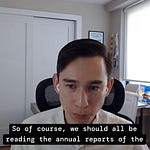About Our Guest
Soren Peterson is a 20-year-old investor and co-author (with his sister Maya Peterson) of "The Early Bird: The Power of Investing Young." Soren has been investing since the age of 7 and brings a unique perspective on building wealth through long-term investing from an early age.
Episode Highlights
Early Beginnings (03:47)
Started investing at age 7 when his father gifted him one share of Nintendo
"Invest in what you know" was one of his first investing lessons
Began attending Berkshire Hathaway annual meetings at age 10
Family Influence (05:08)
Father emphasized coding and investing as essential skills
Mother taught financial discipline and savings habits to fund investments
Parents encouraged both practical business experience and strategic investing
The Power of Ownership (06:08)
Young Soren couldn't believe he could own a piece of a real business
Trying to explain stock ownership to grade school friends who "thought he was crazy"
The transformative realization that stocks represent actual business ownership
Challenges for Young Investors Today (08:32)
Student loan burdens creating financial headwinds
Need for better financial education amid technological access to markets
The importance of investing in companies you understand
The Magic of Compounding (11:11)
Focus on long-term, value-based investing rather than short-term gains
Research showing how investing summer job earnings can fund retirement
The exponential growth effect that most people underestimate
Warren Buffett making 99% of his wealth after age 60
Signal vs. Noise in Investing (16:49)
The challenge of finding quality information amid overwhelming financial noise
The emotional and psychological aspects of successful investing
How luck and early exposure created opportunities
Seeing Businesses Everywhere (20:43)
How investing changes your perspective on everyday brands and companies
Writing to Lego at age 8 asking why they weren't publicly traded
Viewing businesses through an analytical lens and thinking about competitive advantages
Business Ownership vs. Stock Trading (24:55)
The mindset difference between owning a ticker symbol versus a business
Using the proxy voting process to deepen your connection to companies
The importance of competitive advantages in high-quality investing
Circle of Competence and Learning (29:15)
The danger of overconfidence in your investing abilities
Learning from friends about products and services you don't personally use
Asking better questions about why people choose certain brands or services
Investing as a Lifelong Pursuit (33:55)
The "coffee can" method of buying high-quality companies and holding them
Looking beyond daily price movements to focus on business fundamentals
The power of reading every public document about companies you own
The Thesis-Driven Approach (41:11)
Staying focused on your original investment thesis
Chuck Ackray's wisdom: "American Tower might just be the next American Tower"
Not cutting off compounding at the knees when things are working well
Learning from Mentors (51:16)
The value of community and learning from experienced investors
Todd Wenning and Tom Gaynor as key mentors
Learning from both successes and failures—your own and others'
Defining Success (62:20)
Success as a journey rather than a destination
The importance of a holistic, three-dimensional view beyond just financial returns
The role of community in the investing journey
Key Quotes
"The idea as a seven-year-old kid, where probably my main focus at the time was Legos, the fact that I had the potential to be a partner in a large corporation was something that didn't feel real."
"I remember writing early on about looking into if you can retire from a summer job... if you were to work every summer from when you're a freshman in high school through some of college and you invest all that money and you just never touch it... then you have a modest retirement by the time you're 65."
"I think the average hundred bagger took at least 19 to 20 years before it became a hundred bagger. So showing that holding period already, if you're selling a company even as a long-term investor after five years, you're basically guaranteeing that you're not going to invest in 100 baggers."
"The more I learn, the more I feel like I don't know, which is, I'd say, generally exciting because I still feel like I have a whole career ahead of me to learn."
Books and Resources Mentioned
"The Early Bird: The Power of Investing Young" by Soren and Maya Peterson
"One Up On Wall Street" by Peter Lynch
"100 Baggers" by Chris Mayer
Flyover Stocks newsletter by Todd Wenning
Podcast Program – Disclosure Statement
Blue Infinitas Capital, LLC is a registered investment adviser and the opinions expressed by the Firm’s employees and podcast guests on this show are their own and do not reflect the opinions of Blue Infinitas Capital, LLC. All statements and opinions expressed are based upon information considered reliable although it should not be relied upon as such. Any statements or opinions are subject to change without notice.
Information presented is for educational purposes only and does not intend to make an offer or solicitation for the sale or purchase of any specific securities, investments, or investment strategies. Investments involve risk and unless otherwise stated, are not guaranteed.
Information expressed does not take into account your specific situation or objectives, and is not intended as recommendations appropriate for any individual. Listeners are encouraged to seek advice from a qualified tax, legal, or investment adviser to determine whether any information presented may be suitable for their specific situation. Past performance is not indicative of future performance.












